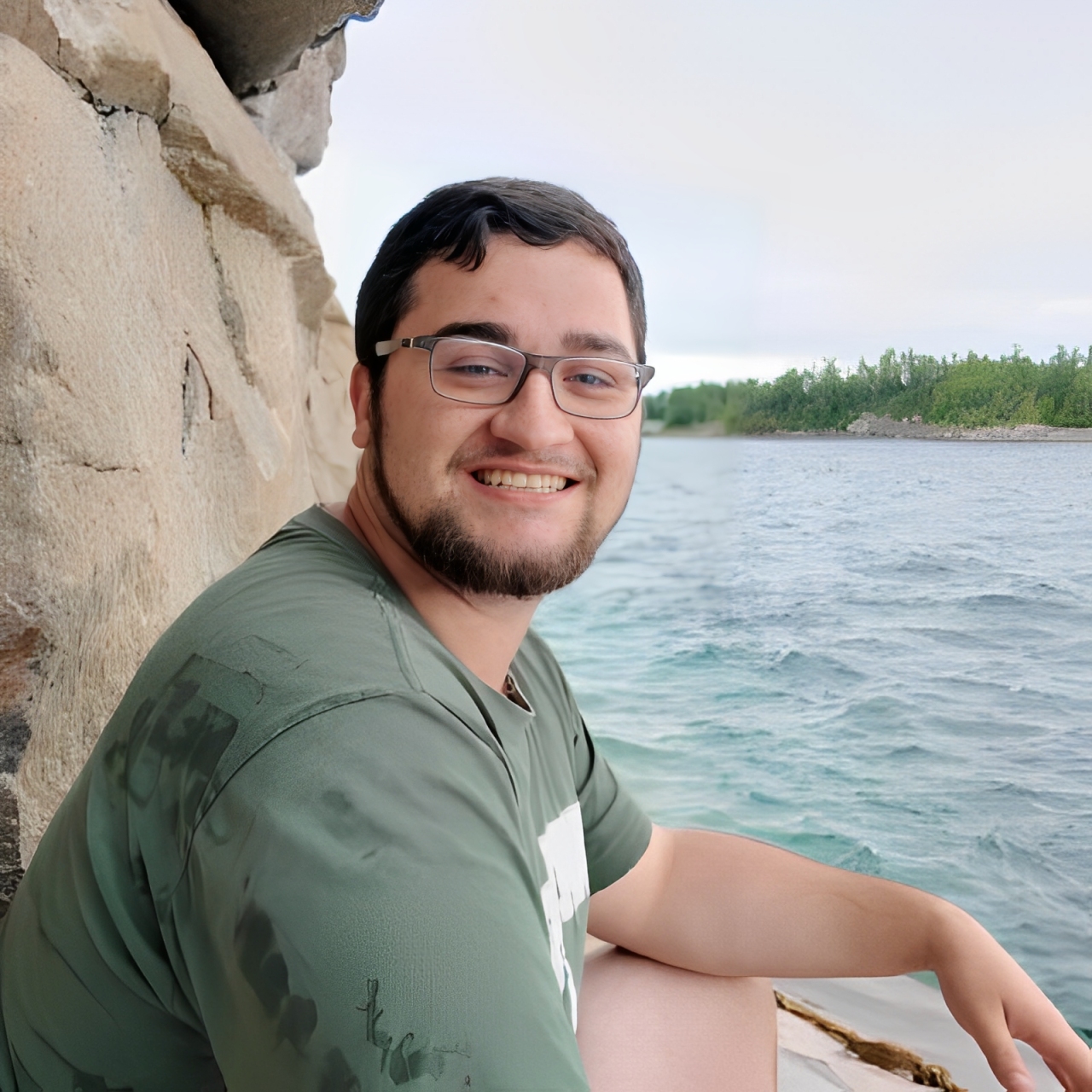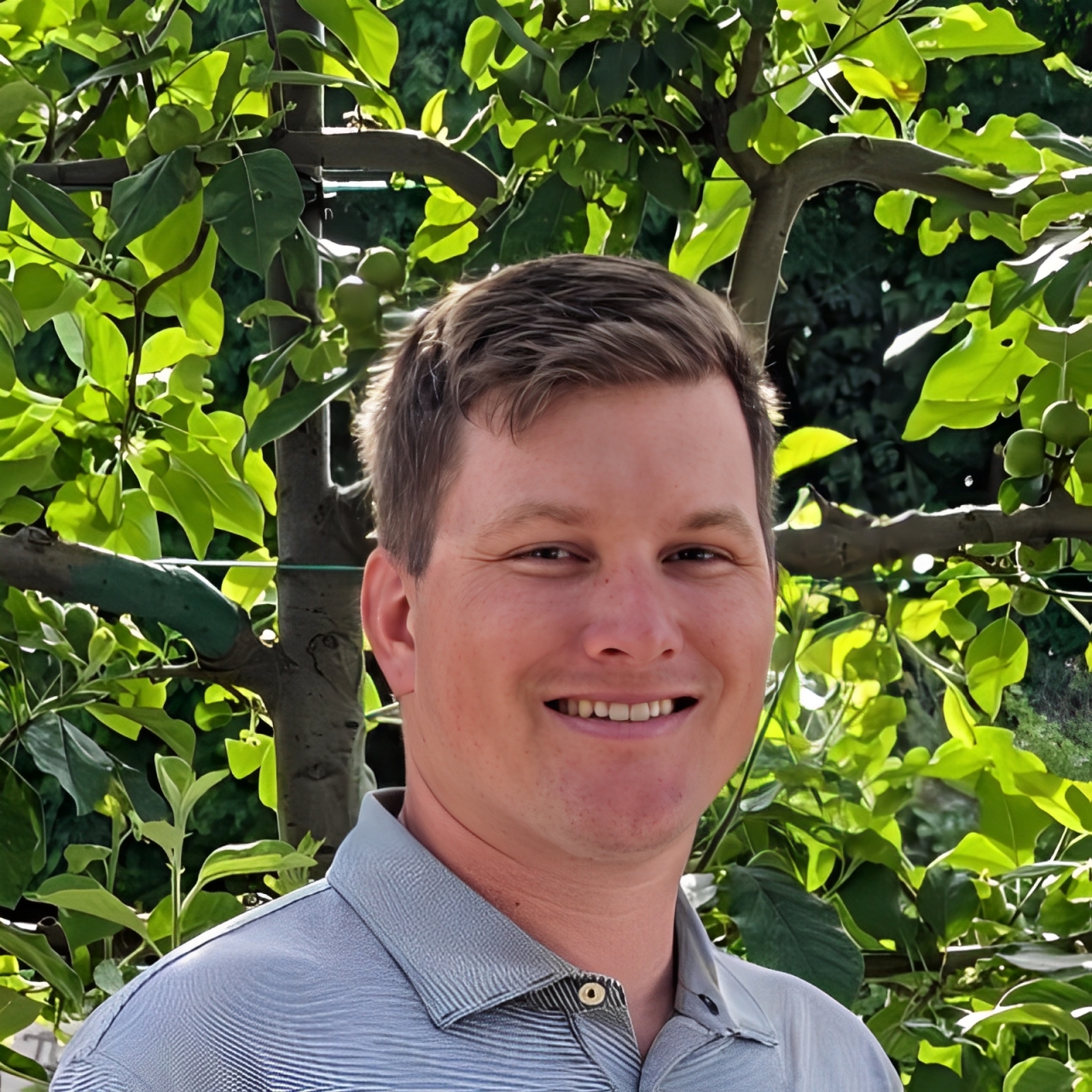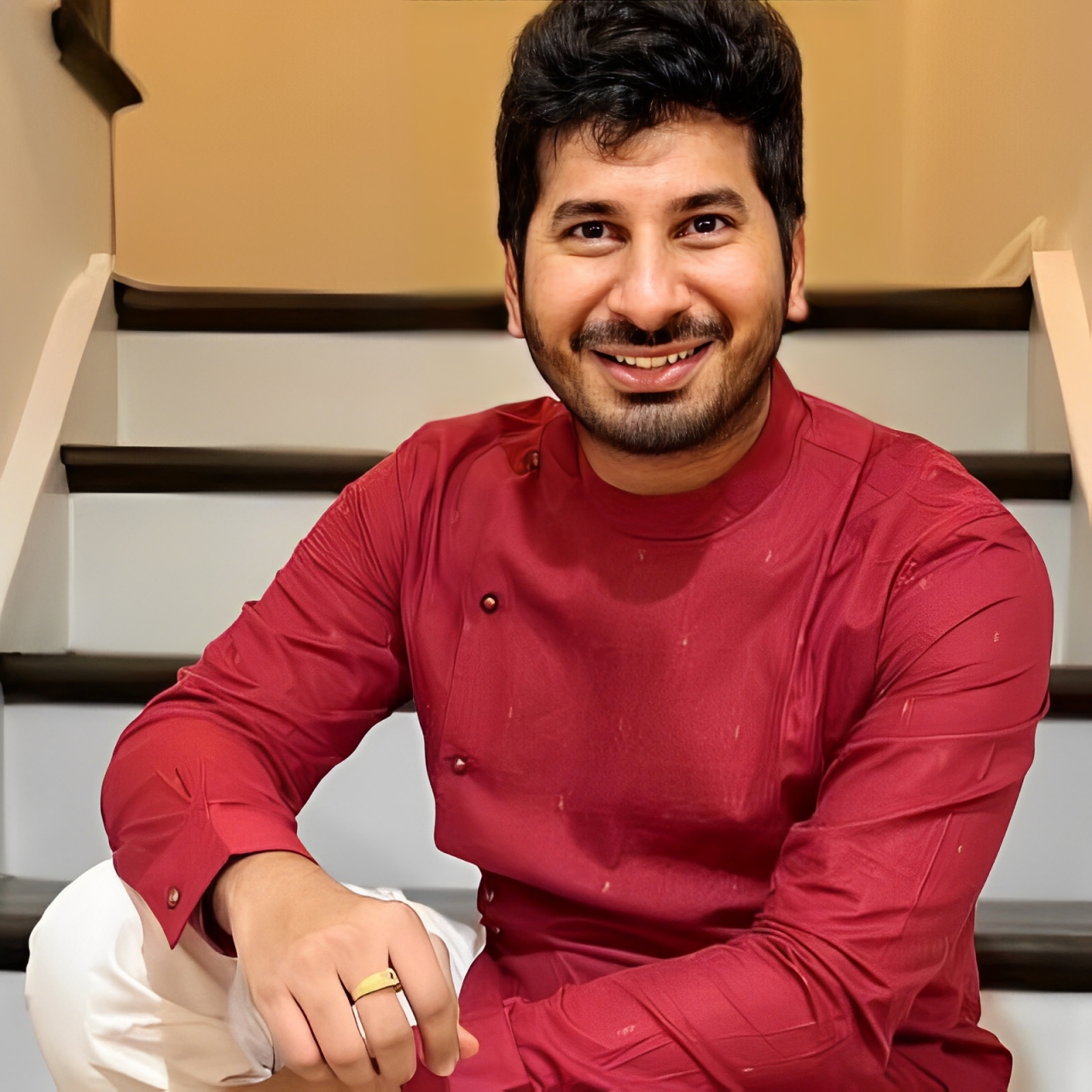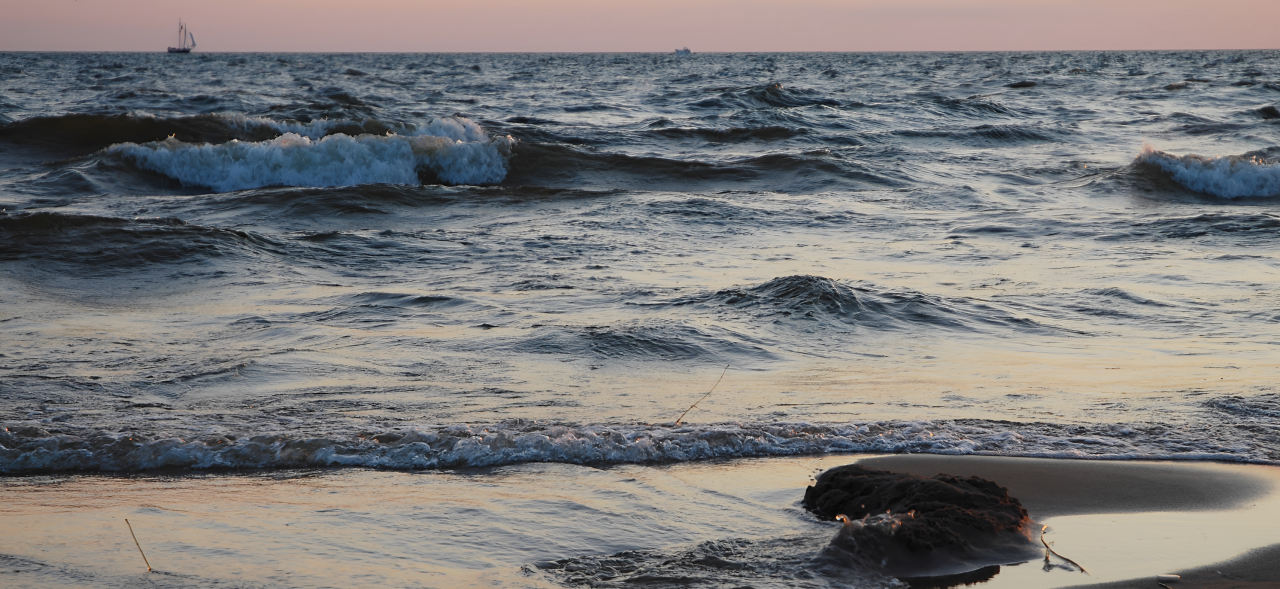Published March 29, 2025
The Robert J. Delisa Scholarship Fund, established by Michigan State University alumna Sally Delisa in honor of her late husband, provides financial support to College of Agriculture & Natural Resources (CANR) undergraduate and graduate students interested in water research and environmental sustainability, or the responsible balance between human needs, environmental, social and economic factors.
Since 2020, students from various CANR departments have received the award, allowing them to further their research of water-related issues at MSU. Four former Delisa Scholarship recipients can comment on how they heard about the award, how it has allowed them to further their water research, and what motivates them to tackle such a complex issue as water.

Greg Rouland, PhD student in the Department of Biosystems and Agricultural Engineering.
Greg Rouland, 2020-2021
Among the recipients of the Delisa Scholarship is Greg Rouland, a second-year PhD student in the Department of Biosystems and Agricultural Engineering (BAE). His research focuses on low-volume, local meat processors and addresses the primary challenge of how to manage the wastewater produced from these operations—a source of both water and industrial pollution. Initially, Rouland’s academic interests were in biomedical sciences, but during his junior year of undergrad, his perspective shifted. Eager to gain research experience, he reached out to Dr. Steven Safferman, then head of the BAE graduate program, who encouraged him to apply for the Mynsberge Scholarship.
“That’s what initially got me in the lab,” Rouland said. “I originally planned to do this for a few semesters, but I had a change of heart. I was mainly helping with graduate students, but just seeing the scope of research, because I didn’t realize how broad of a category water was. It [water research] honestly seemed like a better opportunity.”
The realization that water is a universal necessity—impacting manufacturers, individuals and communities alike—solidified Rouland’s decision to pursue a career in water research. One of his earliest research projects under Dr. Safferman involved studying wastewater for six small meat processing plants in Michigan. These plants faced recurrent permit renewals for land applying wastewater—issued to prevent contamination of the groundwater table—but lacked comprehensive data on the composition of their wastewater.
“There’s all this research that people are doing in the labs,” Rouland said. “[But] a farmer, or the facility owner of a meat processing plant, they’re not out there reading literature constantly. So, using the knowledge that I have, and bringing it to them, that’s where a lot of my research has shifted to.”
The project collected and analyzed water samples from the septic systems and treatment lagoons of these plants, using 21 different parameters to characterize the water. Findings were later compiled into a publication and personalized reports were given to each facility, including tailored recommendations for improvement.
Rouland’s dedication to addressing critical water issues was made possible in part by the Delisa Scholarship, which allowed him to continue his research despite the financial demands of college. And on days when his motivation wanes, it helps to remember that there are people—like Robert and Sally Delisa—who stand behind him and believe in the relevance and importance of his research, he said.

Mike Rabe, graduate student in the Department of Plant, Soil and Microbial Sciences.
Mike Rabe, 2023-2024
Mike Rabe’s passion for responsible water use began during his 15-year career in the golf industry where he witnessed the bad rap course managers received for their water usage despite efforts to manage resources responsibly. This inspired him to pursue water research, focusing on developing more efficient irrigation systems.
A graduate student in the Department of Plant, Soil and Microbial Sciences (PSM), Rabe’s research compares traditional overhead sprinkler irrigation with a subsurface irrigation system. The latter uses 60% less water and eliminates the need for supplemental irrigation.
“When you supply water from underneath,” Rabe said. “You don’t have all the environmental factors like evaporation, [or] wind blowing the water around; it’s a more efficient way to deliver the water.”
Golf courses are known to consume a significant amount of water for turfgrass irrigation and the maintenance of playing features. Traditional greens, composed mostly of sand to facilitate drainage, require daily watering due to sand’s poor water retention. In Michigan, golf course superintendents in Oakland County reported pumping more than 1.1 billion gallons of water out of rivers, lakes, streams and groundwater aquifers in 2014. Innovations like the one Rabe is studying provide a viable option for reducing water inputs with potential savings of up to 90% in the future, he said.
In addition to his subsurface irrigation system, Rabe is currently exploring a potential partnership with San Diego State University (SDSU).
“My advisor and I gave a talk in San Diego, California, talking about this project, and they [SDSU] were very interested,” he said. “It’s a methane consuming bacteria that they’re looking at applying to turfgrass systems [which] increases the water holding capacity of soil.”
Methane-consuming bacteria, or methanotrophs, can indirectly contribute to better soil structure and water retention by promoting healthy soil ecosystems and increasing organic matter.
Rabe’s interdisciplinary efforts reflect his belief in the power of collective knowledge to solve complex water-related issues. Being awarded the Delisa Scholarship has allowed him to advance his research, overcoming his initial uncertainties about winning the award as a turfgrass major.

Goutham Thotakuri, graduate student in the Kravchenko Lab in the Department of Plant, Soil and Microbial Sciences.
Goutham Thotakuri, 2024-2025
Another notable awardee of the Delisa Scholarship is Goutham Thotakuri, a graduate student in the Kravchenko Lab in PSM whose childhood prepared him for a career in water research.
Born in the southern part of India, in an area increasingly affected by water scarcity, and raised by an occupational farmer father, Thotakuri witnessed first-hand the hardships that arise from a lack of water, including the inability to harvest crops due to insufficient rainfall. This motivated him during high school to pursue a bachelor’s degree in agriculture, eventually moving to the United States to earn his master’s degree from South Dakota State University before coming to MSU in 2022.
“Even in my master’s, I was working with how crop management is going to impact soil health,” Thotakuri explained. “And that’s where my water research came from. This was a great opportunity for me to get into what’s going on in the soil at the micro scale, and what is the effect of water that’s been influencing the soil structure, microbial activity, and ultimately, the yield.”
Thotakuri’s research uses micro-CT scans to visualize soil changes under drought conditions, with a specific focus on sandy loam soils from the Kellogg Biological Station at Michigan State, Escanaba in the Upper Peninsula, and Wisconsin. Examining these samples has allowed him to better understand how varying amounts of water affect soil, and the crucial role water plays in the alteration of soil structure.
Too little water can lead to the development of big cracks and the closure of small pores, influencing the transport of nutrients throughout the soil, and limiting the microbial activity. This can lead to a pulse of decomposition and the release of excess carbon dioxide back into the atmosphere upon rewetting.
“Let’s say there are microbes here, and there is food for the microbes here, but what connects them? It’s the water,” Thotakuri explained. “So, there is enough food, but no water. Microbes can’t reach that food, and without processing, it just stays in the soil and eventually gets decomposed in an undesired way when water becomes available again and is released into the atmosphere as carbon dioxide, which we don’t want.”
With its emphasis on water research, the Delisa Scholarship perfectly aligned with Thotakuri’s passion for understanding soil-water interactions and addressing the challenges brought on by water scarcity, he said. Through his research, he hopes to develop strategies that enhance agricultural resilience in the face of changing environmental conditions.

Megan Ransler, third-year undergrad in the Department of Biosystems and Agricultural Engineering.
Megan Ransler, 2024-2025
Megan Ransler, a third-year undergraduate student in BAE and one of the most recent recipients of the Delisa Scholarship, specializes in ecosystem engineering and was drawn to water research because of personal interest and environmental experiences. Growing up in the Paw Paw and Kalamazoo area of Michigan, Ransler was surrounded by lakes and witnessed both the Kalamazoo River oil spill and the Flint water crisis.
Currently a professorial assistant through the Honors College, Ransler is working on a research project analyzing infiltration rates in a constructed bioretention basin using a handmade versus commercial infiltrometer. An infiltrometer measures the rate of water infiltration into soil and is important in understanding soil water dynamics, designing irrigation and drainage systems, and evaluating how land management practices influence soil water infiltration.
“I work on the citizen science of it, Ransler said, “Measuring how fast water can go into the soil, characterizing the different tap or fibrous roots and how that can impact it. For my citizen science part, I’m using a handmade infiltrometer [and] then we’re testing whether there’s a statistical difference or not.”
Ransler’s research aims to establish the handmade infiltrometer for citizen science, encouraging community involvement in data collection. If handmade and commercial infiltrometers perform similarly, more people can measure infiltration rates on their own, enabling farmers, for example, to assess soil water storage for crop use.
In addition to her academic work, Ransler has gained industry experience through internships as a water resource engineer for the city of Kalamazoo and with a water and wastewater firm in Kalamazoo.
The Delisa Scholarship has provided Ransler with financial support, allowing her to balance her studies as an undergrad with her water research and internships.
“I’d say definitely financial is a big part,” she said. “Especially since I was doing an internship last year, and in the evenings, I worked at my part time job. Knowing that I can have this financial support definitely helps.”
The future of water research at MSU
Michigan State University is a leader in water research, tackling local and global challenges through interdisciplinary collaboration. With units like the MSU Water Alliance and the Institute of Water Research (IWR), MSU and its faculty, specialists and students can address critical water issues related to sustainability, agriculture—which accounts for 70% of water use—and contamination.
Pouyan Nejadhashemi, MSU Research Foundation Professor and director of IWR, underscored the importance of water research at MSU, highlighting the university’s unique position as a land-grant institution with access to the Great Lakes. He explained that, while water scarcity and pollution have always existed, they have escalated in recent years due to increasing climate unpredictability and growing contamination.
“If you examine the pattern of climate change, it becomes clear that since 1970, we have seen a shift from natural fluctuations to a consistent upward trend,” Nejadhashemi explained. “What used to be considered a once-in-a-century event is now occurring much more frequently. This rapid increase in the frequency of extreme events is something we never anticipated or planned for.”
Nejadhashemi stated that water pollution, once limited to a few naturally occurring chemicals, has worsened with the emergence of harmful contaminants, such as PFAS.
“When I first began modeling PFAS, the EPA had reported 7,000 different PFAS compounds,” he explained. “A year and a half ago, that number increased to 11,300, and I am confident the list has only grown since then.”
New chemical introductions are outpacing our ability to detect and regulate them, meaning many harmful substances, like PFAS, go unnoticed for decades—despite being present since the 1950s—until they are already widespread and potentially dangerous.
The impact of the Delisa Scholarship extends far beyond its financial support. It fosters the next generation of water researchers who are equipped to handle the most pressing water challenges of our time. From wastewater management and sustainable irrigation to soil-water interactions and citizen science, Delisa scholars lead the way with practical, science-based solutions.
All undergraduate and graduate students in the College of Agriculture and Natural Resources are encouraged to apply for the Delisa Scholarship. To learn more, visit: https://www.canr.msu.edu/academics/undergraduate/scholarships/
Story by Aja Witt

